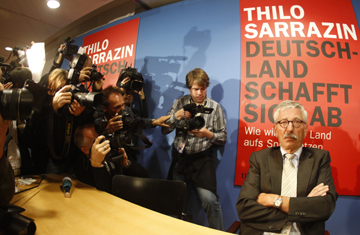
Bundesbank board member Thilo Sarrazin's new book includes claims that the influx of immigrants is watering down German culture
Books written by bankers rarely cause much of a stir, except, perhaps, among other bankers. But a new book by Thilo Sarrazin, a director on the board of the Bundesbank, Germany's central bank, has the nation up in arms. The book has caused such furor that — barring an unexpected legal twist — it may have cost him his prestigious job.
In Deutschland Schafft Sich Ab (roughly translating as "Germany Is Doing Away With Itself"), published in August, Sarrazin argues against further immigration by drawing links between lower-class heritage and a lack of intelligence. He also claims that the influx of immigrants from Turkey, the Middle East and Africa is watering down German culture.
For days, critics have been raging against the comments Sarrazin has made in his book and on the publicity circuit, one of them going so far as to accuse him of echoing Nazi ideology. The former Berlin politician rejects such criticism and insists that he is not a racist. Still, the backlash has become so intense that on Thursday the Bundesbank board voted unanimously to request that German President Christian Wulff dismiss Sarrazin from the board. Wulff has already hinted that he will oblige, but Sarrazin's dismissal from the Bundesbank would be unprecedented and there could still be a legal obstacle to firing him.
In a TV interview on Sunday, Chancellor Angela Merkel called Sarrazin's comments "unacceptable." And Bundesbank President Axel Weber, a leading contender to replace Jean-Claude Trichet as head of the European Central Bank, came under pressure to oust Sarrazin for damaging the Bundesbank's reputation. Meanwhile, the leadership of the Social Democratic Party has said it will begin proceedings to revoke Sarrazin's membership, saying his comments are not compatible with the party's principles.
Rarely has a public official raised such a ruckus in the debate over immigration in Germany. And some worry that Sarrazin represents the start of a new trend: a shift toward Islamophobia, long a phenomenon on the fringe, among the German elite.
"Actually, the opposite is happening," says Hajo Funke, a sociologist and expert on extremism at the Free University of Berlin. "The German elite is united in its criticism [of Sarrazin]. Sarrazin is representative of a latent Islamophobia, but one which has not been able to take shape in any political formation as we have seen in the Netherlands and Austria."
One reason for that is Germany's knee-jerk reaction against any kind of seductive, populist candidate who reminds voters of Hitler. Another, Funke says, is that although Germany was late in opening a debate about immigration, the political elite has begun to deal with the issue, recently creating, for example, a government-backed Islamic conference to bring Muslim community leaders together with German government officials to map out an effective integration strategy.
It also helps that few of Sarrazin's arguments hold water. While his complaints about the low education levels of Germany's immigrants are supported by statistics — 9.6% of immigrants, who make up 18% of the population, have no secondary-school diploma, compared with just 1.5% of Germans — experts reject his argument that innate low intelligence is the culprit. One of the main criticisms of Germany's integration policies from international organizations like the Organization for Economic Cooperation and Development is that in international comparisons, migrants in Germany tend to have the lowest level of education — a reflection, they say, of the country's failure to provide them with good schooling. "We have invested far too little in the education of the Turkish immigrants in the past and we are paying the price for it today," Hans Merkens, a sociologist at the Free University of Berlin, tells TIME. "To blame genetics for a lack of education among migrants is complete nonsense."
And even though many Germans may agree with Sarrazin that the country has kept its doors open for migrants far too long, the numbers appear to show that immigration is actually declining. In 2000, net immigration of Turks — Germany's largest minority — into the country was 10,130 people, but by 2005, the number had plunged to 1,746.
In a commentary published in the German weekly Der Spiegel, Reiner Klingholz, director of the Berlin Institute for Population and Development, a think tank, suggested Germany needs more, not less, immigration. The Federal Statistical Office predicts that even with steady net immigration of 150,000 to 200,000 people a year, the German population will decline by 12 million by 2050. "The average age in Germany would rise toward 60 by the year 2050, over 15% of the country's citizens would be over 80, and one-third of these would be senile. Such a society would no longer be capable of playing a role in the global economy," Klingholz wrote.
Some passages in Sarrazin's book are so polemical they are no doubt designed to intentionally provoke his countrymen: "I don't want the country of my grandchildren and great-grandchildren to be largely Muslim, or that Turkish or Arabic will be spoken in large areas, that women will wear headscarves and the daily rhythm is set by the call of the muezzin," says one. And to some commentators, the book's biggest strength is that it has raised debate — although not necessarily the right one. "Sarrazin has made it easy for his critics to evade the real issue," wrote the conservative daily Die Welt. "Instead of the blatant shortcomings of our policies, we are now discussing whether Sarrazin is a racist or not. What a missed opportunity."
